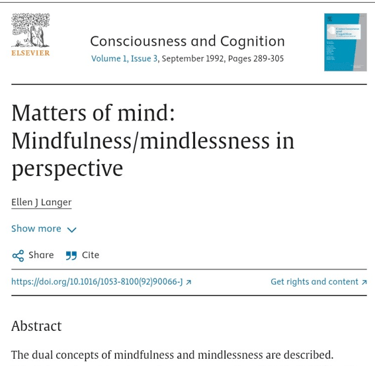Definitions of Mindlessness
What exactly is mindlessness? There are many definitions, such as ones from dictionaries, intellectuals, and the media. In some ways, these definitions agree, but often they are contradictory. How do they apply to MindlessnessX?
9/15/20251 min read


What exactly is mindlessness? There are many definitions, such as ones from dictionaries, intellectuals (i.e. psychologists, researchers), the media and bloggers. In some ways, these definitions agree, but often they are contradictory.
Miriam-Webster dictionary defines mindlessness in many ways.
marked by a lack of mind or consciousness
marked by or displaying no use of the powers of the intellect
requiring little attention or thought
not intellectually challenging or stimulating
The Berkeley Well-Being Institute uses the following phrases in defining mindlessness.
a state of unawareness
going through the motions without being consciously aware of your surroundings or your inner states
being on autopilot or responding robotically
without conscious awareness of what you are doing, thinking, or feeling
The Cambridge Dictionary’s definition is
the quality of being stupid and meaning nothing (Ouch!)
the quality of not needing much thought or mental effort
Ellen J. Langer, Department of Psychology, Harvard University. An avid researcher into the positive effects of mindfulness, Ms. Langer defines mindlessness as (Langer, 1992)
a state of mind characterized by an overreliance on categories and distinctions
oblivious to novel aspects of the situation, functioning by rules and routines
habit, functional fixedness, overlearning and automatic processing
when we believe we know something well
relying on distinctions drawn in the past
Amongst all the negative definitions, there are references to mindlessness that can be found in the concept of MindlessnessX. First, a brief description of MindlessnessX:
Simple
Enjoyable
Interruptible
Allows wandering thoughts
No self-judgement or punishment
Reduced cognitive focus (i.e. less brain power)
Has a goal and sense of accomplishment
Most importantly, gives our mind a break
Looking at mindless definitions above, many sound good considering we’d like a break from concerted effort in dealing with the world and the crazy thoughts running through our heads.
Requiring little attention, thought or mental effort
Going through the motions without being aware of your surroundings or inner states
Minimal information processing
When we believe we know something well
Relying on distinctions drawn in the past via rules and routines
We are running in a world of endless cognitive focus. Giving your mind a break with a "mindless" activity is a good thing. Enjoy your MindlessnessX!
Give yourself a break through MindlessnessX FIND YOUR X
CONTACT
Balance EVERY WEEK
Email: info@mindlessnessx.com
Text: 248-238-6825
© 2025. All rights reserved.
follow